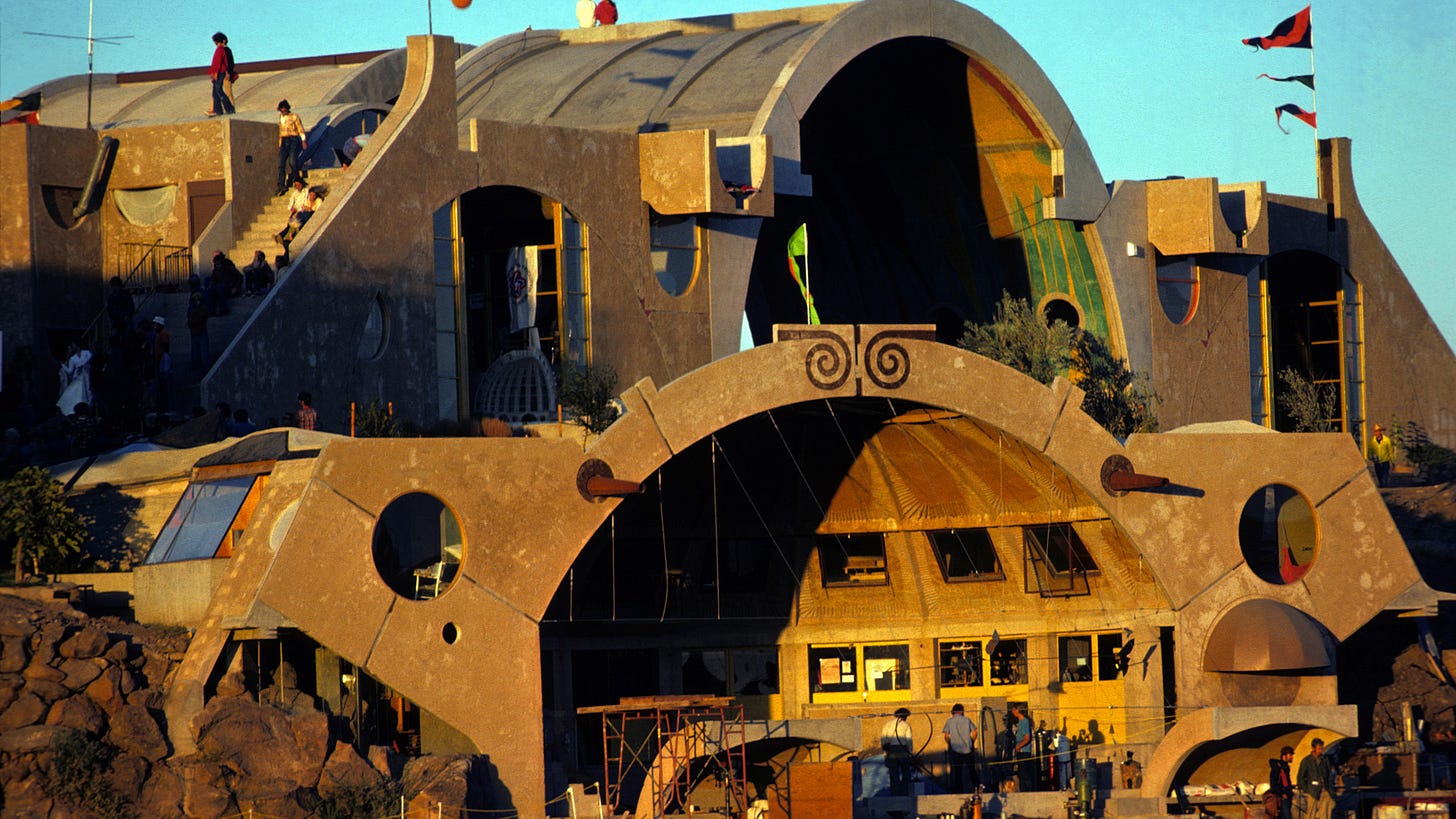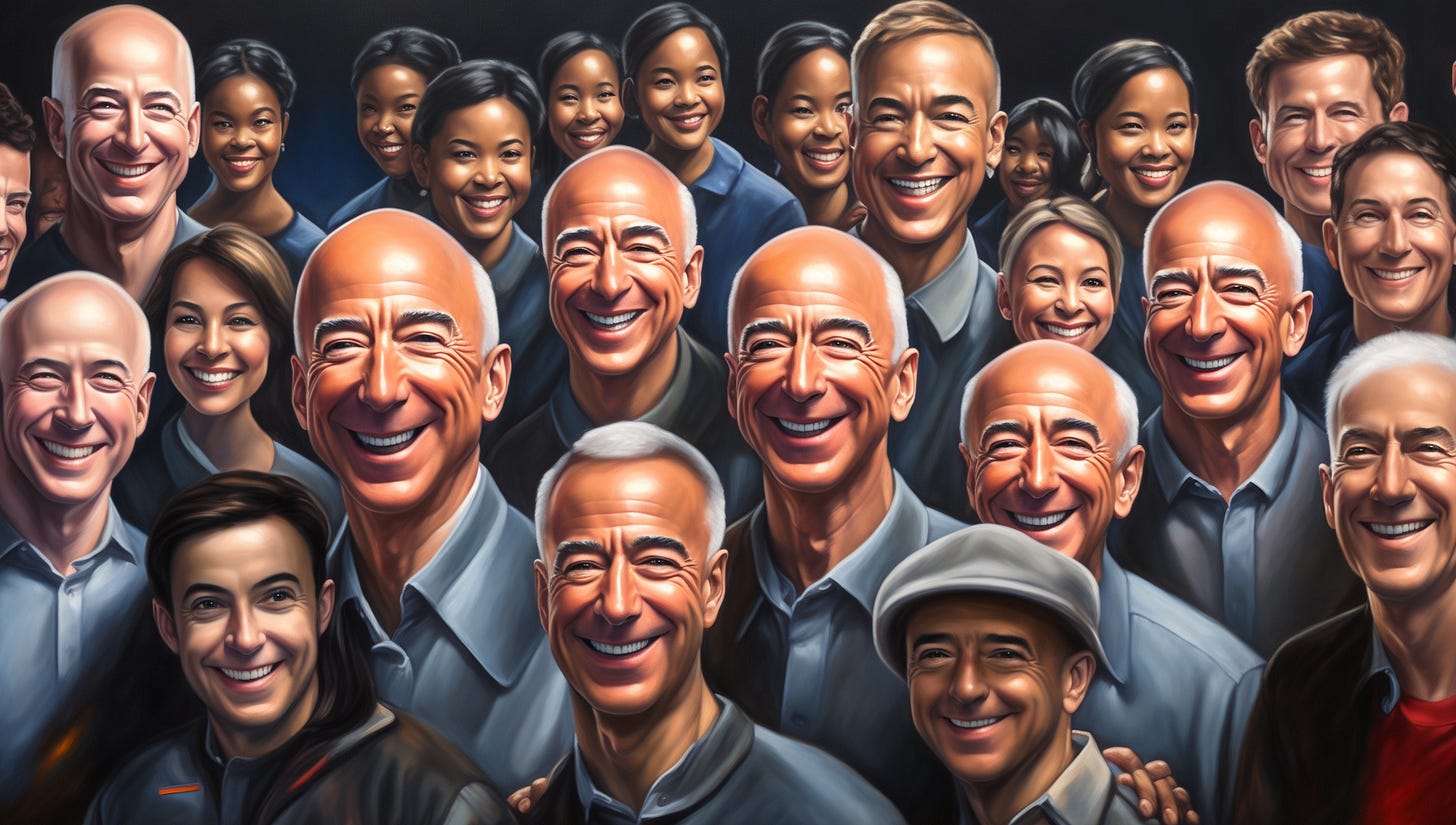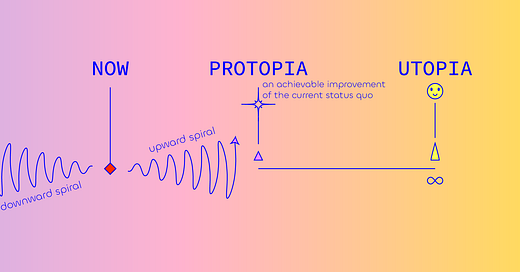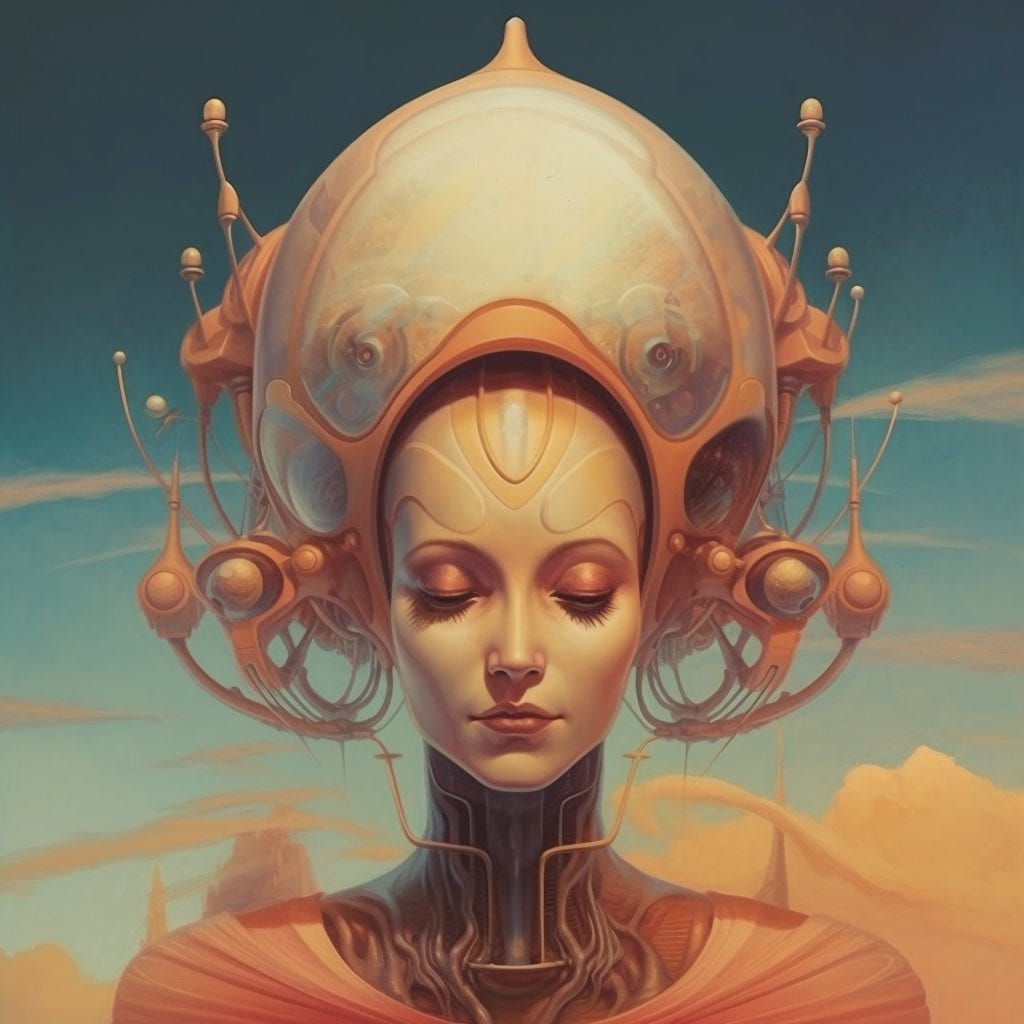Protopia: Pre-Figurations of Utopia 🙌
What defines a Protopia and how can it lead us to an optimistic future?
Protopia is a term coined by the futurist Kevin Kelly, which refers to a state of constant becoming, a destination that is always in the process of being created. Unlike Utopia, which is a static and idealized society, Protopia is a dynamic and constantly evolving state.
According to Kevin Kelley’s brief description in this video, Protopian ideals include integrating progressive technology that prioritizes mankind’s holistic well-being, emphasizes communities, encourages diversity, and embrace mistakes.
Our job is not to stop the AIs, it’s to make better AIs
This article is about how these ideals can be implemented in real life to create a Protopian future.
Protopian Progress > Utopian Idealism
Utopia is on the horizon. I move two steps closer; it moves two steps further away. I walk another ten steps and the horizon runs ten steps further away. As much as I may walk, I'll never reach it. So what's the point of utopia? The point is this: to keep walking. - Eduardo Galeano

From alternative currencies to brand new cities, there are many emerging ‘Utopian’ projects all around the world. Many of these projects are inspired by beliefs that existing world-dominating systems are fundamentally flawed and need to be abolished or replaced, such as capitalism, the global governments, the oil empire, capitalistic oligarchies, institutionalized educational and research systems, dogmatic religions… Many believe that in order to create anything of absolute justice, we must make a hard switch to create a new societal system.
It is audacious to pursue a Utopia, but Utopia is not without its vices.
The original essay Utopia by Thomas Moore was transformational at the time as it proposed lots of very progressive ideas such as the abolishment of private property, gender equality, collective governance, religious freedom, and more.
These all sound like good stuff, right? In reality, by enforcing these ideals for a ‘perfect’ society, Utopia also advocates no tolerance of undesirable moral values, for example, adultery can lead to social ostracism, and universal surveillance is strictly enforced.
If Utopia were in 2023, it might look like a country with great thought leaders and surveillance cameras at all corners.🤔
The collective yearning for Utopia reflects the problems and imperfections of the current status quo. Utopia is an important concept in building the next chapter of human society. We need to have a direction in order to know where to walk towards, we need to have an idea in order to know how to approach it. Yet the fine line between pursuing Utopia and Protopia is that:
Utopia advocates for extreme perfection while Protopia embraces imperfection and mistakes.
Protopian efforts believe that better worlds are created out of continuous learning and adaptation and that we must be willing to experiment, take risks, and learn from our failures in order to continue moving forward.
Positive Sum Games in an Interconnected World
The historical pursuit of superior dominating technology and capitalistic profit maximalism caused industries to progress without priority of interconnectedness of the well-being of all lives on earth.
We live in a chaotic web of redundant complex systems as a result. The economical, ecological, and existential crisis of human society has gone to such a complex point, that it is impossible for individuals and small communities to iterate fundamental changes to address these issues.
Holistic problems require holistic solutions. Protopian solutions are designed to have this interconnectedness in mind, they play positive-sum games with all players on Earth, including Earth itself, so that outside of winners and losers, the infinite game keeps playing.
Our world is a macrocosm made of many microcosms. Just like how healthy cells make up healthy proteins, healthy proteins make up healthy organs, which make up a healthy body. The Protopia concept can be found across all spectrums at all scales.
As Above, So Below.
Decentralized Governances: Cooperatives and DAOs
Instead of following Jeff Bezos, we must become our own Jeff Bezos (bad joke)

Cooperatives (or Co-ops) are worker-owned and governed businesses that offer an alternative framework that empowers communities to lead in the decision-making process and participate in democratic governance.
DAOs (Decentralized Autonomous Organizations) share a similar ethos, except that it uses virtual currencies to authenticate collective governance.
Here’s an excellent article about Co-ops and DAOs by Austin Robey on what they can learn from each other.
At the center of Co-ops and DAOs are communities. They both allow a collective of people to be captains of the ship, decentralizing governance, and sharing collective ownership.
These types of collectives are by no means easier to manage. They rely on a steady level of group harmony and mission alignment, their members require general governance literacy, and great people skills.
In these smaller, more intimate organizations, we can’t just treat each other like assholes and expect no ripples in return. There are certain communal responsibilities we can’t avoid, and interpersonal feelings and confrontations that we’d have to face.
Communities, Interconnectedness, and Personal Growth
If it’s so much more challenging to participate in decentralized governance, why should we encourage it?
Hierarchical systems progress faster because they avoid the redundancy of unorganized democracy and leaderless chaos: workers don’t need to agree, they just need to obey.
But it is through the process of aligning mission then do we have the opportunity to ask ourselves very important questions: what is our individual mission? how does this align with the greater community and our work? What is our ‘work’? The ‘job’ becomes more than just following protocols, instead, we gain levels of sovereignty and corporate and collaborate through our own free will.
Instead of being in a disconnected institutionalized system, cooperatives require us to openly communicate, which allows us to be more connected with our emotions and reasonings.
Practicing more intimate collaborative governance allows us to naturally build more intimate relationships with ourselves and our immediate communities; understand and interrogate our true mission and values; contribute and corporate meaningfully to the world at large. We won’t avoid disharmonious with distance, nor would we offload hard critical decisions to designated leaders for our own complacency, we’d have to face them all.
We’d all have to learn ‘how not to be assholes’, become more friendly neighbors, compassionate collaborators, forgiving teammates, understanding lovers, and in general, better humans.
By embracing these practices, we would have the opportunity to re-learn deeply how to live, create, love, and cooperate with the interconnectedness of communities and the world at large, so that living collectively becomes second nature —— that is Protopian.
If you want to go fast, go alone, if you want to go far, go together

Conscious Capitalism & Sacred Economics
Bringing the scope up to the world at large, we’d have to talk about capitalism —— the dominant global resource coordination protocol.
Capitalism is like the main headliner of the ‘Whole World Problem Category’, many Protopian builders hold firm beliefs that only through the dismantling of capitalism and money would uplift humanity to a more egalitarian society.
As Mark Fisher pointed out, ‘it is easier to imagine an end to the world than an end to capitalism’. Does it really mean that we’re forever limited from the true liberation of human society if we don’t dismantle everything and rebuild from the ground? I’d prefer to believe otherwise.
In the book Sacred Economics, Charles Eisenstein proposes an alternative perspective of money not as a medium of artificial scarcity and manipulation, but as a potential of facilitating gift exchanges and creating abundance.
Money is a medium that can be used to foster interconnectedness and recognize the inherent value in each person's unique contributions to society at large. This medium is not inherently wrong or evil, but it has been used in many wrongful and inconsiderate ways.
Some key summaries of Sacred Economics are:
Redefining Wealth: shifting from monetary accumulation to holistic well-being of the self, community, and the environment.
Connections -vs- Separations: money could become the medium to facilitate interconnectedness of all aspects of life instead of a tool of alienation.
A Sharing Culture: the act of giving without expectation fosters trust, gratitude, and the strengthening of social bonds
Honoring Gifts: Money is a way to acknowledge the intrinsic value of each individual's unique gifts and contributions to society
Environmental Awareness: Economic activities could be guided by principles of ecological regeneration and respect for the interconnected relationships between humans and the environment.
These practices and ideas can inspire us to transition into a Sacred Economy, where local, inter-connected communities thrive with regenerative practices and sharing cultures, restoring sacredness into our economy.
Conscious Capitalism is another great resource that encourages continuing practices of capitalist exchange with an emphasis on ethics —— competition is great, but do we all need to kickstart empires?
Business is good because it creates value, it is ethical because it is based on voluntary exchange, it is noble because it can elevate our existence, and it is heroic because it lifts people out of poverty and creates prosperity.
Instead of proposing an ideal that absolute existing systems, these ideas propose to integrate with existing systems while improving our relationships with the system, its mediums, and each other.
To Moving Forward
There is not enough room to give these topics extensive descriptions in this article as we will probably publish more detailed writings about each of them. This article is more of my personal understanding of what Protopia could be all about, instead of what Protopia is —- I think nobody knows what it is right now, therefore it’s up to us to decide.
To our beloved readers of this newsletter 💕, hope you’re feeling inspired by your own journey of ‘Protopian’ pursuits.
Let us know what you think of this article, what does Protopia mean to you? Please share, happy to hear from u 😘
Recommended Readings:










I love this. Lots of really awesome and powerful ideas in here. The biology nerd in me has to suggest one small correction....when you say "Just like how healthy cells make up healthy proteins, healthy proteins make up healthy organs, which make up a healthy body." Hierarchically, proteins come before cells. Totally not important for the point you were making, but I couldn't help myself!
Nucleic acids+Proteins+Lipids+Carbs>Cells>Tissues>Organs>Body
Love the content. Keep it coming :)
Great read and lots of gems inside!